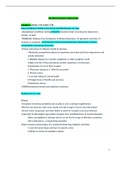Exam (elaborations)
Chamberlain College of Nursing: NR509 Final Exam Study Guide (Latest-2022) / NR 509 Final Exam Study Guide | Complete and Latest Guide |
- Course
- Institution
Chamberlain College of Nursing: NR509 Final Exam Study Guide (Latest-2022) / NR 509 Final Exam Study Guide | Complete and Latest Guide |
[Show more]



